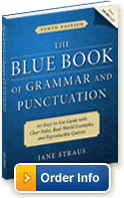|
Welcome to your GrammarBook.com E-Newsletter.

|
"I always learn something new from your E-Newsletters."
- Linda G.
"Thanks for making the grammar rules so easy to understand."
- Rahou H.
"I have used your books a number of times to help my students—not to mention myself."
- Anthony D.
"Thanks for the great grammar info and exercises. I always find something that clarifies what I have become rusty on over the years."
- Bill
|
|
|
Subject and Verb Agreement with Collective Nouns
 Do you use a singular or plural verb to match a collective noun such as team or staff? The answer is, “It depends.” If these nouns are acting as a unit, use a singular verb. Do you use a singular or plural verb to match a collective noun such as team or staff? The answer is, “It depends.” If these nouns are acting as a unit, use a singular verb.
Example: The team is heading for practice this afternoon.
If the sentence indicates more individuality, use a plural verb.
Example: The team are eating with their families tonight.
Would you choose is or are in the example below?
Example (an actual headline from CNN.com): Nearly one in four people worldwide is/are Muslim.
People is NOT a collective noun like team or staff. It is a plural noun. However, the subject is one, which is singular and takes a singular verb. So the answer is is.
In the above sentence, the prepositional phrase is in four people. This means that people is the object of the preposition.
Let’s get real here, however: The intention in this headline is to let us know that nearly 25% of the world’s population is Muslim. That intention gets lost by focusing on one is. It might be better to reword the sentence: Nearly 25% of people in the world are Muslim.
Why is 25% of people are correct? The subject of this sentence is 25%. Fractions and percentages, like team and staff, can be either singular or plural depending on the object of the preposition following. In this case people is the object of the preposition of. We have already said that people is plural. Therefore, 25% becomes plural in meaning.
Example: Twelve percent of the list has/have volunteered to help with the fundraising.
The subject is twelve percent, which will be either singular or plural depending on the object of the preposition that follows. In this sentence, the object of the preposition is list, which is always singular. So the correct answer is has.
To learn more about subject and verb agreement, click here.
Due to the E-Newsletter's large readership, we are unable to respond to individual English usage questions.
|
|
Pop Quiz
Choose the correct verb in each sentence below. Scroll down to view answers.
1. The team is/are headed to the nationals since winning the state finals.
2. The mock trial team was/were happy with their presentations to the judge.
3. Nearly 25% of the population is/are Muslim.
4. Our staff meets/meet on Tuesday mornings to discuss customer complaints.
5. Our staff works/work hard to meet their goals and deadlines.
Free BONUS Quiz For You!
[[firstname]], because you are a subscriber to the newsletter, you get access to one of the Subscription Members-Only Quizzes. Click here to take a Subject and Verb Agreement Quiz and get your scores and explanations instantly!
Correction
Thanks to alert reader Rebecca F. who pointed out that underground is not the only word in the English language that begins and ends with und (Wordplay section of E-Newsletter of September 27, 2011). Rebecca noted that the word underfund also begins and ends with und.

"So convenient...hundreds of quizzes in one click."
[[firstname]], Subscribe to receive hundreds of English usage quizzes not found anywhere else!
- Take the quizzes online or download and copy them.
- Get scored instantly.
- Find explanations for every quiz answer.
- Reproduce the quizzes to your heart's content.
- EASY to use.
- No software to download.
- No setup time.
- A real person to help you if you have any questions!
"Fun to test my skills!" "The explanations really help...thanks!"
Your choice: Subscribe at the $29.95 or $99.95 level ($30 off - regularly $129.95).
"I download the quizzes for my students who don't have computer access."
Subscribe today to receive hundreds of English usage quizzes not found anywhere else!
"Makes learning English FUN!"
 |
Don't need all the quizzes at once?
You can now purchase the same quizzes individually for ONLY 99¢ each. Purchase yours here. |

Get Yours Today!
Get Amazon’s #1 Bestseller in Four Categories!
#1 in Grammar
#1 in Reading
#1 in Lesson Planning
#1 in Vocabulary |
The Blue Book of Grammar
and Punctuation by Jane Straus
An indispensable tool for busy professionals, teachers, students, homeschool families, editors, writers, and proofreaders.
Now available in print AND as an e-Book! Over 2000 copies are purchased every month!
Order Your Copy Today!
- Hundreds of Grammar, Punctuation, Capitalization, and Usage Rules
- Real-World Examples
- Spelling / Vocabulary / Confusing Words
- Quizzes with Answers
|
View the entire contents online
Discounts available for schools, bookstores, and multiple copies. Order Today!
Pop Quiz Answers
1. The team is headed to the nationals since winning the state finals.
Team is being used as a cohesive unit so a singular verb is required.
2. The mock trial team were happy with their presentations to the judge.
Team is plural because separate presentations were given. Also, when the plural their is used, the implication is that the collective noun is being used as a plural.
3. Nearly 25% of the population is Muslim.
The word population is a collective noun that can take either a singular or plural verb, depending on the intention of the author. The intention here is to indicate that this percentage represents a single group.
4. Our staff meets on Tuesday mornings to discuss customer complaints.
Staff, a collective noun, is acting as a single unit in this sentence.
5. Our staff work hard to meet their goals and deadlines.
Their is a clue that staff is not acting as a unit. Therefore, the plural work is needed.
How do you know that work, not works, is plural? Think about which word you would use with he and which word you would use with they.
Examples:
She works too hard for her age.
They work harder when the foreman is around.
Wordplay
Pluralities
by Eugenie A. Nida
We'll begin with a box, and the plural is boxes;
But the plural of ox should be oxen, not oxes.
Then one fowl is goose, but two are called geese;
Yet the plural of moose should never be meese.
You may find a lone mouse or a whole lot of mice,
But the plural of house is houses, not hice.
If the plural of man is always called men,
Why shouldn't the plural of pan be called pen?
Cows in the plural may be cows or kine,
But the plural of vow is vows, not vine.
And I speak of a foot and you show me your feet,
But I give you a boot, would a pair be called beet?
If one is a tooth and a whole set are teeth,
Why shouldn't the plural of booth be called beeth?
If the singular is this and the plural is these,
Should the plural of kiss be nicknamed kese?
Then one may be that and three may be those,
Yet the plural of hat will never be hose.
We speak of a brother and also of brethren,
But we say mother, we never say methren.
The masculine pronouns are he, his and him,
But imagine the feminine she, shis, and shim.
So our English, I think you all will agree,
Is the trickiest language you ever did see.
Learn all about who and whom, affect and effect, subjects and verbs, adjectives and adverbs, commas, semicolons, quotation marks, and much more by just sitting back and enjoying these easy-to-follow lessons. Tell your colleagues (and boss), children, teachers, and friends. Click here to watch.
|


 Do you use a singular or plural verb to match a collective noun such as team or staff? The answer is, “It depends.” If these nouns are acting as a unit, use a singular verb.
Do you use a singular or plural verb to match a collective noun such as team or staff? The answer is, “It depends.” If these nouns are acting as a unit, use a singular verb.




